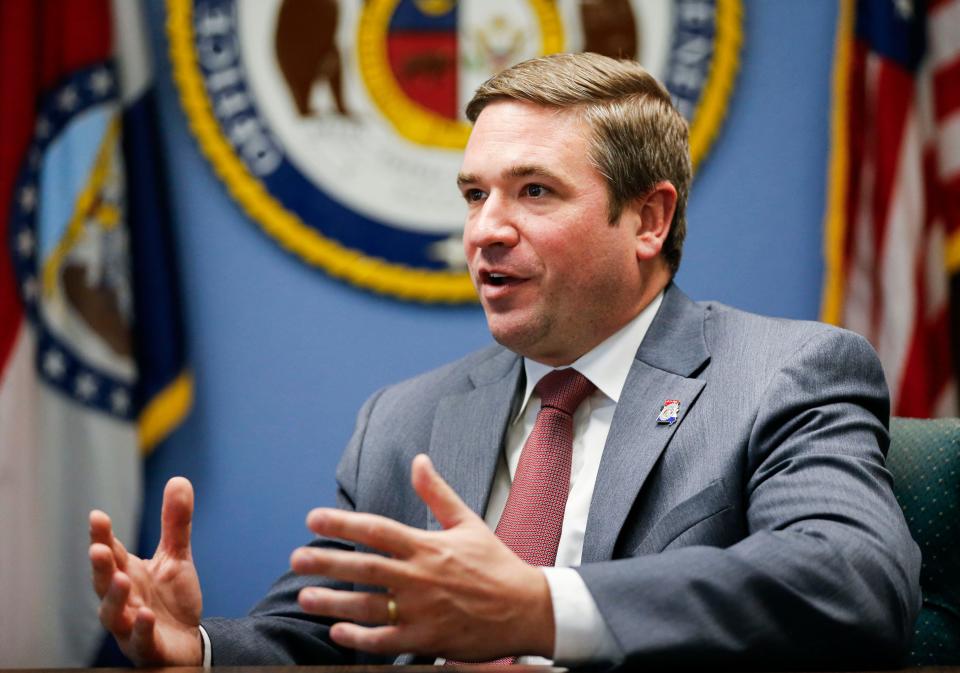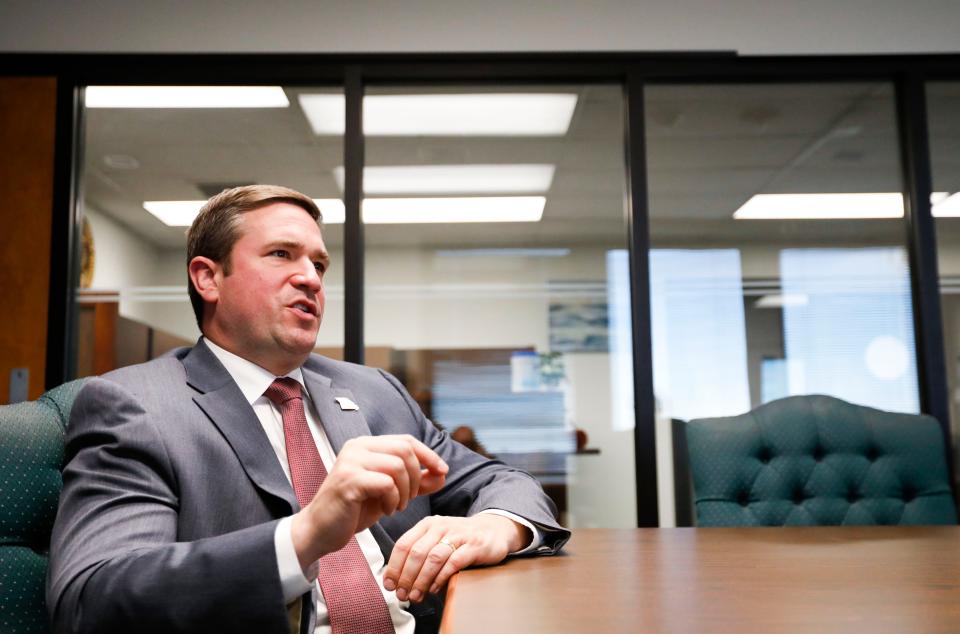After report of antisemitism, Missouri's AG is defending X, formerly Twitter. Here's why.
Arguing that Missourians who donated to a left-leaning media watchdog nonprofit may have been misled, state Attorney General Andrew Bailey has waded into a recent controversy involving the social media platform X, formerly known as Twitter.
Bailey, who is seeking election to his first full term as attorney general, launched an investigation into Media Matters, a liberal advocacy group, on grounds that it improperly solicited donations from Missourians to target X, which has been mired in controversy since Elon Musk purchased the company in 2022.
“The concern here and the allegation here is that Media Matters defrauded Missourians in a coordinated scheme to manipulate the marketplace and bully advertisers to pull out of X, formerly known as Twitter, in order to attack Twitter and do away with the last platform dedicated to free speech in America,” Bailey said.

Media Matters released a report that showed advertisements from prominent brands being featured alongside antisemitic content. Following this, major brands including IBM, NBCUniversal and its parent company Comcast pulled their advertisements from X to avoid any future instances of this occurrence.
Musk soon filed a lawsuit against Media Matters, alleging that it manufactured the results of the report by following users known for posting antisemitic content, which then generated similar social posts, all but ensuring that any advertisements would appear next to harmful content.
Media Matters, a Washington D.C. based nonprofit, has since called Musk’s lawsuit frivolous, asserting confidence in its report and legal standing.
Bailey’s own investigation is scrutinizing “potentially unlawful business practices” on grounds that it “may have violated Missouri consumer protection laws, including laws that prohibit nonprofit entities from soliciting funds under false pretenses.”
“Media Matters is a 501(c)(3) organization and so they can only raise money for the nonprofit purpose, but their nonprofit was not founded in order to manipulate the marketplace to attack X,” Bailey said.
Bailey is requesting records from the nonprofit pertaining to strategy to target advertisers on X, communication with third parties about that strategy, conversations with specific advertisers, and internal messages regarding “content intended to ‘cancel,’ ‘deplatform,’ ‘demonetize,’ or otherwise interfere with businesses or organizations located in Missouri, or utilized by Missouri residents.”
Bailey’s investigation hinges on finding sufficient evidence that Media Matters made any effort to skew the results of their initial report, which has not been definitively proven by Bailey or any of the other attorneys general looking into the matter, such as Texas Attorney General Ken Paxton and Louisiana Attorney General Jeff Landry.
However, Bailey said that X’s own internal review showed that they were only able to replicate occurrences such as those found in the Media Matters report “one out of 500 million times for one of the advertisers and only two out of 500 million times for one of the other advertisers.”
“This is manipulation of an algorithm designed to emphasize controversial speech that was then used to bully those advertisers into pulling out X,” Bailey said. “The advertisers have become pawns in the market manipulation, which creates a whole new set of problems because it runs afoul of antitrust law to have a conspiracy to form a combination in restraint of trade.”

Bailey and Landry penned a joint letter to advertisers urging them not to be “swindled by activist deception and dive into a controversial issue that only harms Americans and free speech.”
“Sometimes these militant campaigns to punish the free speech of others have short-term success. You may recall how activists were able to get Major League Baseball’s All-Star Game moved out of Atlanta based on trumped-up and false allegations of racism — spread by the President, no less — after the Georgia General Assembly enacted reforms to the state’s voting laws. Yet, now we see that the same All-Star Game is returning to Georgia in 2025 as genuine facts emerged and the false smear fell apart,” Bailey and Landry wrote in a joint letter.
They ended by encouraging advertisers, among them Apple, Disney, IBM, Sony and others, to “strongly consider this context and the perverse incentives of activists before quickly jumping to conclusions based on assertions that are likely false.”
More: U.S. Supreme Court will hear Missouri case challenging federal influence on social media
Jared Schroeder, a professor of media law at the University of Missouri School of Journalism, sees similarities between this investigation and other lawsuits currently underway in Florida and Texas that seek to ensure that private actors aren’t limiting free speech.
Although Bailey’s investigation stands on grounds of market manipulation and potential antitrust violations, his intentions are to ensure that X, a platform that purports to encourage free speech, isn’t limited by private actors having an impact on its existence.
“What our Attorney General's doing here is about whether or not Media Matters actions led to limitations on free speech,” Schroeder said. “From the Media Matters side of this, it's concerning that a government entity, the Attorney General of Missouri, is singling them out and investigating them.”
Regardless of whether Bailey and Musk are proven to be accurate in their accusations that a manipulated algorithm was used to create the Media Matters report, Schroeder recognizes one definite outcome of this investigation.
“Indirectly, it causes fear and concern and controls speech,” Schroeder said. “It can make other entities that want to point out misbehavior or problematic expression by private actors, like Media Matters did for Elon Musk, afraid to do so if they're going to be investigated. It causes a chilling effect.”
This article originally appeared on Springfield News-Leader: MO Attorney General investigates group that found antisemitism on X

